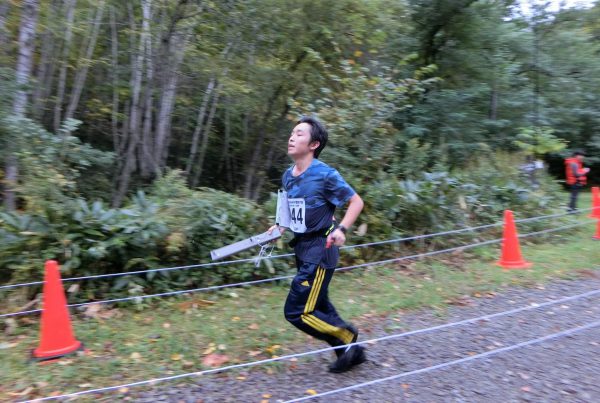Recently, the Nagaoka Review team sat down with Dr. Tran to discuss a little about herself, her decision to come to NUT and her current research on the theory of safety and intelligence in the human-robot interaction.
Good afternoon Thao-san, thank you for taking time to speak to the Nagaoka Review team. First, would you like to introduce yourself?
Yes, my name is Tran Phuong Thao. You may call me Thao. I am a Control Engineer, specializing in automation, robotics, haptics and tele-operation.

I am from Ho Chi Minh city in Vietnam. I came to Japan in 2008 as I received the MEXT scholarship to pursue my Masters degree at the Nagaoka University of Technology (NUT) . In 2010, I pursued the doctoral course and graduated in 2013. From then, I have been working at NUT. At first, I started off as a post-doctoral researcher, and now I am a specially appointed Assistant Professor. I belong to the Science of Technology Innovation department.
What is your field of research?
Currently, I am researching about human-robot interaction. In particular, the regulation between the interaction of robots and human beings to ensure no human injury or environmental damage would occur.
The research I am working on is a combination of control theory and AI. As robots collaborate with human beings, contact is established between the robot with the human and the object. The safety of operation of robot is important. And we hope to develop leading innovative robotics and motion control from this research.
We are looking for advanced theory to help us to regulate the human-robot interaction. As such, we need to combine multiple fields such as AI to create a safer and intelligent system. I am particularly interested to learn about RPA and see if I could apply some of the theoretical aspect into my research.
Besides that, I am interested in AI as well. My research requires an in-depth understanding of AI as it is related to Data Science. In order to utilize data for AI processing, we need to have pre-processed data and these data has similar sequence. RPA uses this knowledge in order to reduce repetitive tasks. I am focusing on data processing now, which requires me to cross over to Data Science, so it’s something a little distant from what a Control Engineering specialist does. And I find this exciting!

When did you start this research?
I started the research a year before, in 2019. Previously, my research was focusing on advanced control theory. Currently. I am working on this research by myself, and I am currently in the theory part of the research. I am exploring data science for the processing of data for AI and deep learning.
It is my wish to teach Data Science in NUT in the near future. It is gaining popularity, and it is therefore important to impart knowledge to the upcoming workers who would be partaking in the new business scene.
Why are you interested in this research topic?
In recent times, AI is being developed strongly around the world and it is being utilized in many industries such as the service industry, besides robotics.
I would like to apply the technology in Japan. With the aging population, the lack of labor is already happening. Robots will have to replace human labor, so it is imperative to develop such robotic capability that is able to effectively handle the tasks of human beings. We hope to be able to support human beings and the society. The researches in our lab are focused on topics related to motion control of a variety of equipment, based on the control theory, robotics and power electronics.
Why did you decide to come to NUT?
When I was in Vietnam, I was very interested in control and automated engineering. I was impressed by the development in this field in Japan, and the culture and people too made me more interested in coming to Japan. As such, I was determined to come to Japan to pursue a higher education.
NUT is one of the two national university of technology in Japan. I noticed that NUT provides a good environment for me to study, hence the decision to choose this university.
At NUT, I joined the Motion Control Lab under the guidance of Professor Ohishi, and I learned a lot from him. Motivated by so much knowledge gained, I wanted to keep improving so I decided to pursue a Ph.D.

“From the knowledge and experiences in my specialized field as well as from the exchange program between NUT and BBU, I hope to contribute effectively to research and education for the development of human resources with advanced skills in the field of motion control, robotics and artificial intelligence.”
Dr. Tran Phuong Thao
We heard you’d be going to Cluj for a lecturer exchange program. How did you get to know about it?
I was introduced to it by Professor Ohishi. That was the first time I heard about a collaboration between NUT and BBU (Babeș-Bolyai University) in Cluj. Lecturer and student exchanges were planned to further develop high quality human resource. Currently, I am the first NUT professor to be sent for an exchange program.
At this point in time, I am scheduled to be there from 1st April till the end of June. I also hope to visit UiPath and possibly IBM in Romania to do more research.
From the knowledge and experiences in my specialized field as well as from the exchange program between NUT and BBU, I hope to contribute effectively to research and education for the development of human resources with advanced skills in the field of motion control, robotics and artificial intelligence.

What do you think of this statement: “In the future, Robots will replace people and people will be jobless”
Well… In my opinion, it might become a reality if robots become too intelligent to replace human beings. But the other point to think of is, would human beings want to be served by robots for everything? It is a two-way street.
But it is necessary to have robots to assist human beings. It is how we improve the standard of the human life. Technology will always develop, there will always be innovation. I expect we would be able to create pioneering innovation technology in AI and robot, and this could contribute to the betterment of the society.
So, no. I do not think that robots can replace human beings 100%.
This question reminds me about the Luddite Fallacy. We believe that jobs do not get destroyed, but just like energy, it would morph into something else and in this case, our job composition within the economy will be altered. It does not lead to an increase in unemployment in general.
How would work change in the future?
That is a good question. With the increasing capability of the robots or automation system, people can reduce their working time on repetitive work. Especially in the field of research where I am in now, I could spend more time thinking about new research topics. More importantly, researchers will have more time to construct and make more things a reality soon.
What changes do you hope to see in Universities?
In general, I would like the goal of Universities to be about developing education and industrial co-creation. Education has been pretty stagnant for decades, and it is about time for changes to happen.
On my side, I intend to collaborate with industrial partners to learn more. I hope to be able to set foot in UiPath to build more connection with people in the industry. Someone has to start something, and that is what I intend to do.











